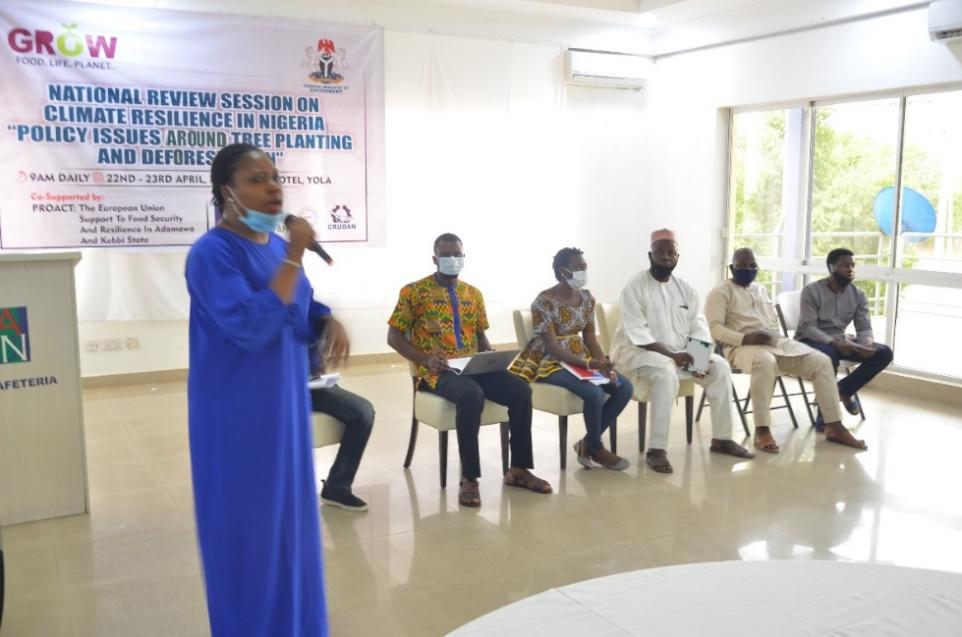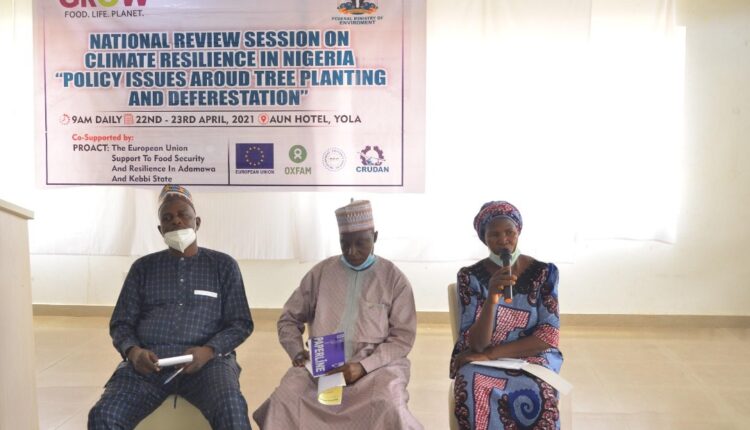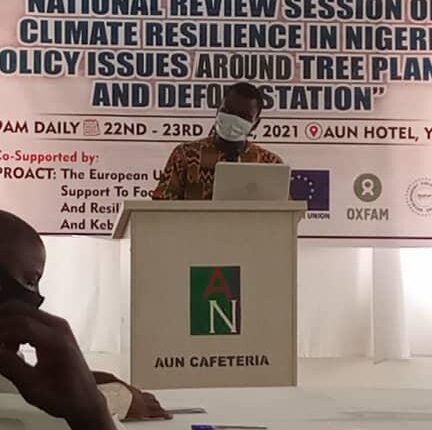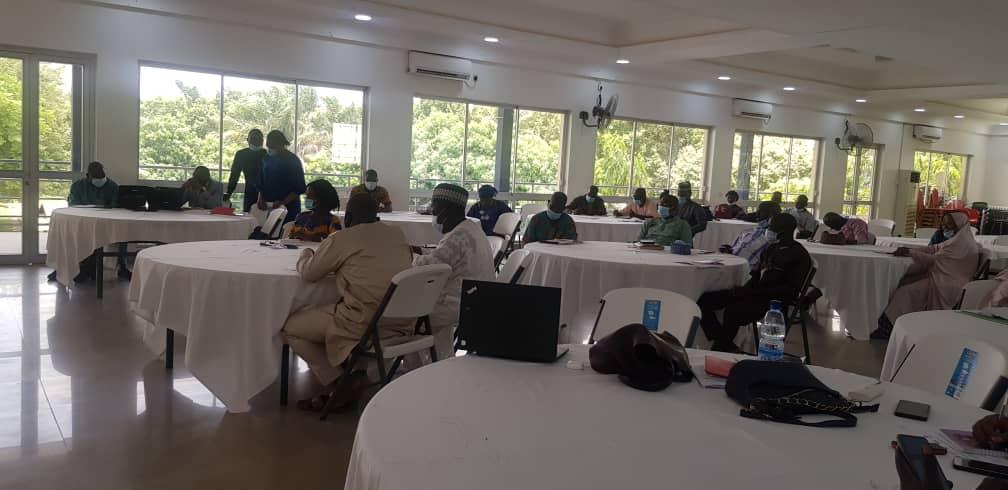
The Climate and Sustainable Development Network of Nigeria (CSDevNet) in collaboration with Oxfam has facilitated the review of Nigeria’s National Climate Resilience on the Deforestation and Tree-planting Policy.
At the review meeting which held from the 22nd to 23rd of April, 2021 in Aun Hotel Yola Adamawa state, representatives from ministries of environment and agriculture, as well as civil society organisations from Taraba, Adamawa, and Kaduna states joined the Federal Ministries of Environment, Agriculture and Rural Development (FMARD) and National-level civil society to deliberate and produce action plan for the reduction of deforestation and improvement of Nigeria forestry policy.
The meeting facilitated lessons and experience sharing across the different states, with a view to fostering federal-state alignment in policy development and implementation for climate resilience through afforestation.

Some of the national challenges identified by the stakeholders were: inadequate and/or obsolete climate change and forestry policy in many of the states that meaningfully address issues concerning deforestation and tree planting; and ignorance and low level of awareness about climate change and the need for tree planting in the broader populace.
Additionally, poorly regulated and indiscriminate exploitation of forest resources without regeneration amidst prevailing unemployment in local communities leads to the adoption of environmentally degrading and destructive livelihoods like charcoal production, firewood vending, wildlife and ecosystem destruction.
They also made mention of lack of viable alternative livelihoods to non-sustainable means of energy, like firewood and charcoal use, further worsening larger challenges; absence of intentional action plans by state and local government for a green economy that is resilient to climate change, including poor policy direction for renewable energy adoption.
The inadequate capacity at Local and State Government levels to develop, implement and enforce appropriate climate change policies, as well as the absence of effective climate legislation were also highlighted.
Lastly, the inadequate number of forest rangers and guards to protect forests from illegal deforestation, and poor climate financing and inadequate resourcing of systems, structures and manpower to drive climate-resilient economic development across different levels of government were highlighted.
The stakeholders recommended that each state representative present at the workshop, as well as the Federal Government officials, should draw action plans.
Key action plans highlighted in the Panel sessions included the Kaduna State’s Ministry of Environment’s resolution to develop the State Climate change policy, embark on an awareness campaign in conjunction with civil society and local media on climate change impacts and the importance of climate actions.

Others include initiating multi-stakeholder engagements on climate resilience related to environmental sustainability and sustainable incomes, and strengthening the capacity of relevant MDAs of government and local government level to ensure improved afforestation efforts and forest management efficiency.
Similarly, the Ministry of Environment in Taraba State agreed to review the state’s forestry laws to ensure the penalties become more stiffer and that it reflects current realities and needs.
The ministry pledged to work with the state House of Assembly to enact Taraba State Forestry regulations to reduce wanton deforestation in the state, and work with Madrid Timber Association and Processed Wood Producers and Marketers Association of Nigeria (PROWPMAN) on the development of an early planting and monitoring framework.
They also intend to work with Oxfam, CSDevNet and other relevant stakeholders on the raising of additional seedlings for schools, local communities and forest reserves, support recruitment of volunteer local forest workers to monitor community forests and check the indiscriminate felling of trees
Other actions include awareness creation among cattle rearers of the effect of forest fire in cooperation with development partners and ensure the sustainability of the state’s current 5 for 1 reforestation project.
The Ministry of Environment in Adamawa State decided to facilitate the approval of the Adamawa State action plan on climate change by the permanent secretary and Ministry of Environment, lobby the State House of Assembly for speedy passage of the Adamawa State forest protection law, work on the planting of one million trees annually in collaboration with civil society organisation in the state, and collaborate with the security agencies on enforcement of the ministry of Environment Afforestation Law, which seeks to plant 3 for every one tree felled.
The Federal Ministry of Environment resolved to provide technical support and know-how to state governments and CSOs on Climate financing grant proposal development to enable access to climate funds, revive national tree-planting campaign, which includes the National Tree planting day, following the approved National Forestry Law, and develop a communication plan and Monitoring and Evaluation framework for the National Forestry Policy 2020.
They also decided to ensure National budget provision for afforestation programs, tree planting and other environmental sustainability commitments, and carry out biodiversity valuation and natural capital accounting across the country for practical understanding and education of stakeholders on the Ecosystem contribution to the National GDP.
In conclusion, stakeholders agreed that the recommendations provided above were actionable and would help the country work towards an inclusive approach to environmental sustainability and climate resilience across the different levels of government.

